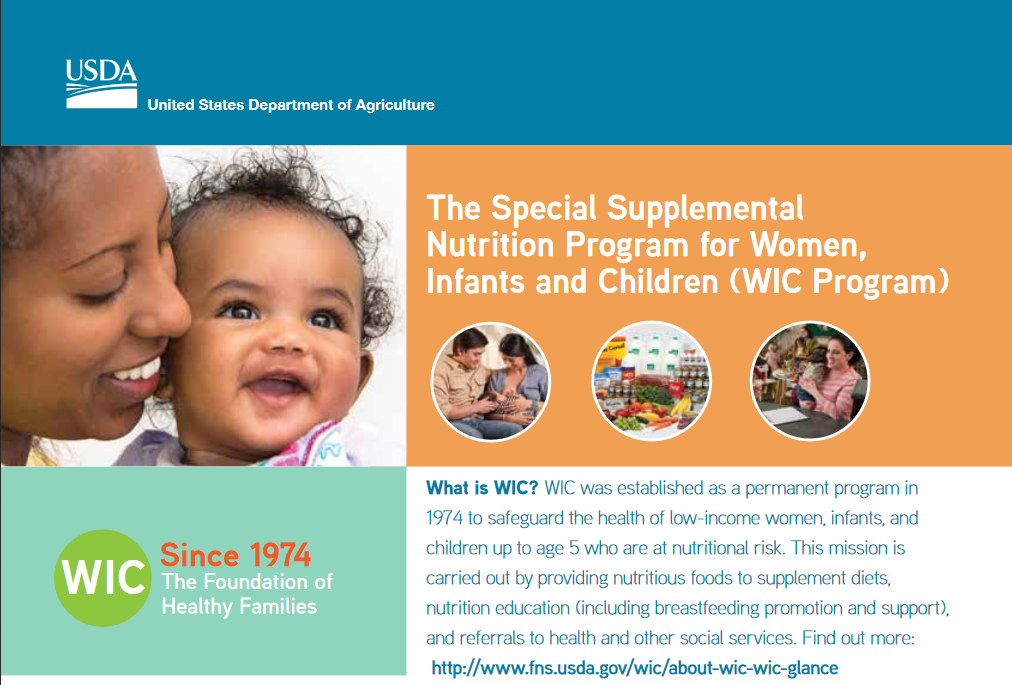
WIC HEALTH ONLINE Non Discriminitory Statement (English & Spanish) WIC Free Language Assistance
What is WIC?
The USDA’s Women, Infants, and Children (WIC) program was designed to safeguard the health of low-income women, infants, and children up to age 5 who are at nutrition risk by providing nutritious foods to supplement diets, information on healthy eating, and referrals to health care.
How WIC helps:
WIC supplemental foods have shown to provide wide ranging benefits. They include longer, safer pregnancies, with fewer premature births and infant deaths; improved dietary outcomes for infants and children; improved maternal health; and improved performance at school, among others. In addition to health benefits, WIC participants showed significant savings in healthcare costs when compared to non-participants. Click HERE to learn more about how WIC helps.
What food benefits do WIC participants receive?
The foods provided through the WIC Program are designed to supplement participants’ diets with specific nutrients. WIC authorized foods include infant cereal, baby foods, iron-fortified adult cereal, fruits and vegetables, vitamin C-rich fruit or vegetable juice, eggs, milk, cheese, yogurt, soy-based beverages, tofu, peanut butter, dried and canned beans/peas, canned fish, whole wheat bread and other whole-grain options. For infants of women who do not fully breastfeed, WIC provides iron-fortified infant formula. Special infant formulas and medical foods may also be provided if medically indicated. Learn more about food benefits HERE.
Am I eligible for WIC services?

Pregnant, postpartum, and breastfeeding women, infants, and children up to age 5 who meet certain requirements are eligible. These requirements include income eligibility and State residency. Additionally, the applicant must be individually determined to be at “nutrition risk” by a health professional or a trained health official.
Click HERE to see if you are eligible for WIC benefits.
What is “nutrition risk” and why is it important?
Two major types of nutrition risk are recognized for WIC eligibility: medically-based risks such as anemia, underweight, history of pregnancy complications, or
poor pregnancy outcomes; and dietary risks, such as inappropriate nutrition/feeding practices or failure to meet the current Dietary Guidelines for Americans. Women, infants, and children at nutrition risk have much greater risk of experiencing health problems. Click HERE to learn more about nutrition risk.
I’m eligible, what do I do next?
Christian County residents who are interested in applying for benefits should contact the Christian County Health Department to schedule an appointment. Applicants will be advised on what to bring to the appointment in order to verify eligibility.
EBT makes it easier to use food benefits.
In most WIC State agencies, participants receive paper checks or vouchers to purchase food, while a few distribute food through centralized warehouses or deliver the foods to participants’ homes. However, all WIC State agencies have been mandated to implement WIC electronic benefit transfer (EBT) statewide by October 1, 2020. EBT uses a magnetic stripe or smart card, similar to a credit card, that participants use in the check-out lane to redeem their food benefits. EBT provides a safer, easier, and more efficient grocery experience and provides greater flexibility in the way WIC participants can shop.
Focus on breastfeeding.
Even though breast milk is the most nutritious and complete source of food for infants, nationally less than 30% of infants are breastfed at 1 year of age. A major goal of the WIC Program is to improve the nutritional status of infants; therefore, WIC mothers are encouraged to breastfeed their infants, unless medically contraindicated. Pregnant women and new WIC mothers are provided breastfeeding educational materials and support through counseling and guidance. Click HERE to explore the benefits of breastfeeding and find helpful resources.
WIC Facts:
- If you participate in another assistance program you may be automatically income-eligible for WIC.
- Breastfeeding mothers are eligible to participate in WIC longer than non-breastfeeding mothers.
- WIC participants support the local economy through their purchases.
- WIC works with farmers markets to help increase participant access to provide fresh, locally grown fruits and vegetables. Click HERE to find out more.
Where can I learn more?
Information on FNS programs is available HERE.
![]()

